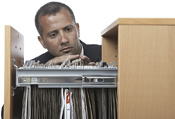
|
|
Updating your office with computer filing
 Step into any office and you'll probably notice there aren't a lot of filing cabinets around. That's because more and more businesses are updating their offices with computer filing.
Step into any office and you'll probably notice there aren't a lot of filing cabinets around. That's because more and more businesses are updating their offices with computer filing.
|
|
There are a number of reasons you may want to update to computer filing, including:
- If you have had your computer(s) for awhile, you probably have noticed that the hard disk is getting full and you having more and more problems finding your documents.
- If your computer system is older, you want to back up your files in case of a crash but it isn't so easy when you have files scattered all over the place.
- Computer filing is safer in the event of fires and floods.
What is computer filing?
Computers are built with internal filing systems. These are in the forms of drives, folders, and files. As a default, your computer will save all of your documents in the My Documents folder. You can also save folders to your C drive, which is a little more secure than the My Documents folder.
Computer filing is much more secure than paper filing. It is password enabled on several levels, unlike a filing cabinet, which can easily be broken into. Even if you use a paper filing system for the majority of your organization, it's still a good idea to back up your files electronically, in the event of water or fire damage or any other type of loss or accident. It may be a tedious task, but if you make it a habit to scan all documents into the computer and then save them as you get them, it will be less daunting than trying to scan and save a stack of papers later.
How to use your computer filing system effectively
There are several things you can do to make your computer filing system more effective:
- Decide first where you will store your files. You can put them in the C drive, which is more secure, or you can put them in the default My Documents folder. If you have a department or your company needs to save work in a central location that can be accessed by everyone, you can designate a spot especially for that.
- Create folders and subfolders. How you organize the folders and subfolders is completely up to you, and there are several methods. You can set up folders by date, such as "April 2008" and then have subfolders with April documents and folders. Or, you can organize them by project or category, such as "Ads" or "Press Releases." You can also put folders for each employee on one of the drives for public access.
- Be careful where you store your files. Not all places on your computer are secure. Sensitive files should be password protected. In addition, make sure you don't save anything confidential to your desktop. Not only are they so easy to find, but large numbers of files stored on the desktop also slow your computer.
- Back up files. While computers are a safe place to store your information, but for added security and as a backup, you may want to save your important files to a CD or removable drive as an added precaution.
Updating your office with computer filing can take a lot of the hassle out of storing and saving files and important paperwork. It is a safer, more secure, makes files easier to find, and takes up less space than file cabinets.
Privacy Policy, Terms of Use